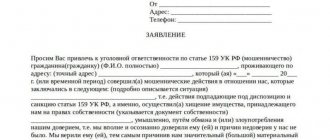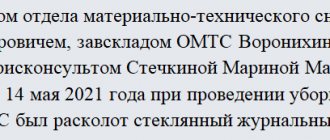Samples of statements about damage to property: to the police station, to the prosecutor's office
Damage to property is an illegal action when an attacker causes material damage to the property of other citizens intentionally or as a result of careless actions.
If your property was damaged, then you should definitely write a statement to the police about property damage.
Liability for property damage
The very concept of “damage to property” implies the complete destruction of property or its partial damage.
Partial damage means that items cannot be used for their intended purpose, but their functions can be restored after repair or restoration.
In order for the person who damaged your property to be held accountable, you need to write a statement about damage to property, and the amount of damage should be:
- more than 2500 rub. in case of intentional damage to property;
- over 250 thousand rubles, if material damage was caused due to negligence.
Intentional damage to property
Intent may consist of the direct intention to damage or destroy other people's things.
If a citizen could not understand that his actions would lead to damage to the property of other citizens, then Art. 167 of the Criminal Code of the Russian Federation.
The punishment under this article provides:
- fine up to 40 thousand rubles. or recovery of earnings up to 3 months;
- corrective, compulsory or forced labor;
- arrest or up to 2 years in prison.
Much stricter sanctions can be applied under Part 2 of Art. 167, which states that the actions of a citizen must be qualified under this part in cases of damage or destruction of property due to hooligan motives by committing arson, explosion, or other dangerous means, or if the actions of the criminal are associated with the death of a person or other serious consequence.
Serious consequences, in addition to death, may also include bodily harm, suspension of the enterprise, disconnection of consumers from water and gas supplies, electricity, etc. On this basis, the culprit can be sentenced to 5 years in prison.
Damage to property due to negligence
Negligence may be expressed in the fact that there was a fire or damage to property occurred as a result of another source of increased danger (for example, explosives, a car).
According to Art. 168 provides for the following types of punishment:
- penalties in the amount of up to 120 thousand rubles or in the amount of the salary of the guilty person for up to 1 year;
- compulsory (up to 480 hours) or correctional labor (up to 2 years);
- forced work (up to 1 year);
- restriction of freedom (up to 1 year) or imprisonment for a similar period.
The legislation provides that citizens as young as 16 years old can be prosecuted for damaging property.
But if there are aggravating circumstances, for example, people were injured as a result of the crime, then responsibility can begin from the age of 14.
The specific term and type of punishment will depend on the degree of guilt and the amount of damage.
Attention! As for the subject of the crime, this includes any property of citizens (except for state property). This can be real estate (houses, cottages, outbuildings, other buildings) or movable property (cars, etc.).
Damage to property may result in not only criminal but also administrative liability.
Art. was introduced into the Code of Administrative Offences. 7.17, which states that for damaging or intentionally destroying someone else’s property, a fine of 300 to 500 rubles may be imposed.
But there is a caveat that administrative liability occurs only if minor damage is caused (that is, damage up to 2,500 rubles). Internal affairs officers have the right to draw up administrative protocols for such offenses. For such a violation they are held accountable from the age of 16.
If you have become a victim as a result of property damage, you must urgently write a statement to the police about property damage, a sample of which you will find on our website.
In your application you must provide the following information:
- Rank and full name of the head of the police department, name of the police department where the application is being submitted.
- Address and zip code of the police station.
- Full name of the victim, and it is also advisable to indicate the registration address and mobile phone number.
- After providing this information, the “Statement of a Crime” is indicated in the middle of the document.
- In the text of the application itself, it is necessary to explain all the circumstances under which your property was damaged or destroyed, as well as the amount of damage, and other data that is relevant to the case must be indicated.
- If you have any information about the criminal: addresses, phone numbers, evidence of his guilt, then you must indicate them. If there were witnesses to the commission of the crime, please indicate their details in the application.
- At the end or beginning of your statement, you must indicate that you are aware of Article 306 of the Criminal Code, which provides for liability for false accusation.
- Please attach all the evidence you have and copies of documents to your application.
- After making a statement to the police, the date of filing the statement to the police and the signature of the applicant are indicated at the end.
It is equally unpleasant for everyone to see a fresh scratch on the side of a recently purchased car.
Troubles and misfortunes happen, beloved things break, but if it happened due to the fault of someone, why should you pay? This article will tell you how to bring the true culprit to justice. Dear readers! Our articles talk about typical ways to resolve legal issues, but each case is unique.
If you want to find out how to solve your particular problem, please use the online consultant form on the right or call
7
It's fast and free!
What does property damage mean? This is causing damage to someone else's property. Conventionally, this action can be divided into four categories. This includes damage in small and large amounts, as well as intentional and unintentional. Let's look at these categories in more detail.
Intentional and unintentional damage to property differs in that in the first case the attacker, accordingly, purposefully carried out his actions so that his victim would suffer some kind of property (in some cases moral) losses.
For example, it could be hooliganism. Unintentional damage is distinguished by the fact that it was committed through negligence, for example, due to careless handling of flammable or explosive substances.
Damage assessment
Damage in a small or large amount differs from each other only in the amount of property or the amount that will be required to repair and restore the thing. If this amount does not exceed 2,500 rubles, then this is minor damage. An amount exceeding the specified amount is already damage on a large scale.
You can also add two more categories, which appear much less frequently in the proceedings of such cases. This is a complete breakdown of the property or partial damage. In the first case, the property can no longer be restored, but in the second, repairs are possible.
Depending on which of the listed categories of damage was caused, the type and amount of punishment depends, which will be described in the article a little later.
You can write a statement about damage to property even if it was minor (up to 2,500 rubles). The culprit will not be held criminally liable, but they may face administrative liability.
Practice is full of examples when a claim was filed for damage to someone else’s property, even if it was a scratch on a car or a broken smartphone screen. Of course, everyone understands that both phones and cars are different, and yet...
So, we have already mentioned that the amount of punishment is directly proportional to the damage caused. Now, according to the categories described above, we will analyze all the penalties, and first we will clarify that the responsibility that a person bears can be both criminal and administrative.
If it was minor damage, then the culprit may be fined from 300 to 500 rubles, this is an administrative liability.
For other categories of damage, there are Articles 167 and 168 of the Criminal Code of the Russian Federation.
Article 167 deals with intentionally causing damage to property on a large scale. Punishment for this will follow in the form of a fine of up to 40 thousand rubles, or compulsory work for up to 360 hours. Arrest for up to 3 months or imprisonment for up to 2 years is also possible.
If, in addition to damage to property, harm was caused to the health of an innocent person, or even death, then the punishment is significantly toughened.
Such consequences could result from arson or hooliganism, for example, when a riotous crowd of teenagers decided to have fun and break a couple of store windows, and inadvertently hit a passerby. The punishment for this is forced labor for up to 5 years or even imprisonment for the same period.
Article 168 refers to damage caused by negligence. The culprit bears responsibility, which is expressed in a fine of up to 120 thousand rubles. or compulsory work up to 480 hours. It is also possible that the culprit will be punished with restriction or imprisonment for up to 1 year.
Only those people who have reached the age of 16 can bear responsibility for causing damage to someone else's property. True, if in addition to property damage, people were also injured, those over 14 years of age may also be held accountable.
If you want to file a claim for property damage, you should first write a statement to the police. Like many others, it is written in a rather arbitrary form, but a few nuances are still worth considering.
- First, you need to provide your full name and address, as well as contact information, such as a cell phone number where you can always be reached.
- The following describes how the crime occurred. Where, when, under what circumstances. What kind of property was damaged? List all the facts that helped law enforcement officials figure it out faster, do not get emotional.
- Indicate the amount of damage caused - for this you could contact specialists who would most accurately determine the amount of damage. If you haven’t done this before, you can roughly estimate it yourself. Of course, during the trial, a person will be appointed who will determine this amount more accurately.
- After the amount of damage, write about what you expect from the further proceedings of the case. So that the perpetrator is called to criminal liability or forced to compensate for the damage.
- Finally, include all the information you know about the offender. If this was your friend, then write his name, perhaps his number or address - everything that you know. If you don't know exactly who it was, you can list suspects. In general, any possibly useful information should be included in the application.
Where to contact?
Types of liability
If a person legally owns property assets, he or she can seek redressal of any irregularities associated with such ownership. In case of intentional damage to someone else's property, the following types of liability may arise:
- civil liability - by filing a claim in court for damages;
- criminal liability - by filing an application with law enforcement agencies about damage to property assets and initiating a case on this fact.
In addition, this provision of the law also contains a description of the special methods that the offender used to cause damage to property:
- hooligan urges;
- socially dangerous actions in the form of deliberate arson, explosion, etc.;
- actions that simultaneously led to the death of citizens or other grave consequences.
If the actions of the guilty person cause significant damage to property assets, the owner may demand simultaneous prosecution of both types of liability. However, only in criminal proceedings will state law enforcement agencies protect the owner.
Punishments for intentional and accidental (due to negligence) damage to property are determined by the Criminal Code of the Russian Federation. According to the Criminal Code of the Russian Federation, “damage to property” means both partial and total (complete) destruction of property.
Partial damage is the degree of damage to property that can be eliminated, repaired, or eliminated.
Complete damage is the degree of damage to property that cannot be eliminated during repair or restoration.
Thus, liability for intentional damage to property is determined by Article 167 of the Criminal Code of the Russian Federation.
Liability for damage to property due to negligence is regulated by Article 168 of the Criminal Code of the Russian Federation.
In order to be held accountable for damage to property on the basis of Articles 167 or 168 of the Criminal Code of the Russian Federation, the application must indicate the cost of the damage caused, equal to:
- Two thousand five hundred rubles for intentional damage to property;
- An amount exceeding two hundred and fifty thousand rubles for damage to property due to negligence;
Judicial review of the case
If, as a result of a statement to the police, a case is opened and a criminal person is exposed, then the victim will need to go to court with a statement of claim. After the opening of civil proceedings in the case, the plaintiff will be able to receive the legally established amount of financial compensation. Compensation for damages must be determined in the same court where the hearings in the criminal case regarding the punishment of the perpetrator took place.
It is necessary to file a claim before the completion of criminal proceedings in the same court. The victim has the right to file a claim after the criminal trial. After determining the punishment for a criminal, you can file a claim for financial compensation in the court at the place of his registration. Filing a claim is not subject to state duty; an appeal is made to a magistrate court for the recovery of up to 50 thousand rubles; large compensation is approved in the district court.
In addition to material recovery, the plaintiff has the opportunity to demand payment of legal costs and legal services from the defendant. If the court finds the defendant innocent in a criminal trial, then a claim for material and moral compensation for damage can be filed separately, Article 1064 of the Civil Code of the Russian Federation.
How to prove the amount of damage
Confirmation of ownership or other legal right of possession is important and can be supported by the following documents:
- in relation to real estate - an extract from the Unified State Register of Real Estate, a certificate of title, lease agreements, etc.;
- in relation to movable things - sales receipts, sales contracts, warranty cards, etc.
It is also necessary to confirm the significant amount of damage. According to the law (Article 158 of the Criminal Code of the Russian Federation), such damage must be at least 5,000 rubles, but it also depends on the property status of the owner. Consequently, if the amount of damage caused was less than the specified amount, citizens can only apply to a civil court with a claim for damages.
After receiving the application and starting a criminal case, law enforcement agencies may order an examination to establish the true extent of the damage caused. At the same time, documents for things or objects will be examined, as well as actual inspection and examination of movable and immovable objects will be carried out.
The following have the right to submit an application:
- citizens who own assets by ownership or other right (for example, lease);
- legal entities in relation to their property;
- authorities - if the damage occurred in relation to a state or municipal fund;
- owners of apartment building premises in relation to common property.
The application and attached documents must be registered upon submission. It is from this moment that the procedural deadlines for initiating a case or denying such a claim begin.
If, based on the results of consideration of the application, a refusal to initiate a case is issued, citizens can challenge such a decision by filing a complaint with senior management of law enforcement agencies, or with judicial institutions. The key point when challenging will be confirmation of legal ownership, as well as the total amount of damage caused.
All-Russian Automobile Club Mazda CX-7, CX-9
As I understand it, you need to write a report to the regional police department (not the local police department) about finding the damage - especially since it obviously costs more than 500 bucks. I remember that it was a hectic affair.
but it’s generally pointless to approach traffic cops like this. I’m a little afraid that they might send it (then they didn’t send it because one of the marks was just a small hole on the wing), but here it’s just deep scratches. I think the damage is significant. As I understand it, you need to write a report to the regional police department (not the local police department) about finding the damage - especially since it obviously costs more than 500 bucks.
I remember that it was a hectic affair. but it’s generally pointless to approach traffic cops like this. I’m somewhat afraid that they might send it (then they didn’t send it because one of the marks was just a small hole on the wing), but here they are just deep scratches.
I think the damage is significant. +100500!
slugivij (5.7.2010, 15:45) wrote: Zhenya, what’s so clever about this? The district police officer is your own guy and you don’t have to wait for anything!
slugivij (5.7.2010, 13:13) wrote: last time my local police officer said that this is only possible in the police department, he has no right.
it seems that this was indeed the case. I went there and the case was closed due to minor damage. nevertheless, reso paid for the helmet.
so now it seems that the main thing is not due to the “lack of corpus delicti”
Strashila (5.7.2010, 20:07) wrote: alas, it’s too late, I only noticed it after I washed it.
and there’s such a scratch there that there’s clearly no foreign paint left.
lan, you'll have to go to the police department and submit an application =(
How to correctly write a statement about property damage to the police?
In accordance with the law, real damage is damage or loss of property as a result of the actions of third parties. Compensation for damages includes the cost of repairing or restoring the property, compensation for defective services, and lost income.
An application to the court is made in writing in the prescribed form. It should include:
- the name of the court to which the claim is filed;
- details of the applicant, his place of residence; if the plaintiff is a company, then the location and name of the person representing the organization and his data;
- details of the defendant, his place of residence or location, if the defendant is an organization;
- information about the violation of the plaintiff’s rights or the threat of their violation, the applicant’s claims;
- facts on the basis of which the victim makes demands and evidence confirming their existence;
- the amount of the claim, as well as the full calculation of the recovery;
- data on the conduct of pre-trial proceedings with the defendant, if the procedure is confirmed by law or an agreement between the parties;
- list of documents attached to the claim. Also indicate the contact information of the plaintiff, his representative and the defendant (telephone, fax, e-mail). Additional facts relevant to the case and petitioner's petition are also attached;
- at the end they put a date and signature (the victim’s representative must confirm his authority to sign such a document and the right to defend the plaintiff in court).
Every citizen of the Russian Federation is the owner of some property. This term can mean real estate, vehicles, and interior items.
If owned property is damaged or destroyed by an unauthorized person, those responsible for this illegal action are subject to criminal or administrative liability. The punishment is imposed in proportion to the damage caused.
In this case, damage is considered to be intentional or accidental damage to someone else's property. Considering that we are talking about a criminal offense, let’s consider how to file a statement to the police about damage to property.
Where to contact
In general, applications for damage to property are accepted by three authorities, depending on the goals of the victim. It looks like this:
- application for criminal or administrative liability - the application is accepted at the police department at the place of residence;
- if the police refuse, you can bring the perpetrators to justice and file a complaint about the inaction of the employees through the prosecutor’s office;
- compensation for damage - courts.
Important! You can submit an application to any of the listed authorities, and they must register it and take appropriate action.
Application form
There are two options to apply:
- Report the incident to the nearest police station, and they will draw up a report;
- Write in person, according to the established template.
Claims to the court are always submitted in writing, and the deadlines for filing applications in such cases are taken into account. If the established period has expired, it will not be possible to receive compensation.
Statement to the police
In fact, this is the first instance where the victim should turn. To avoid having to rewrite the application, it makes sense to familiarize yourself with the sample and the established form of completion.
The statement might look like this:
A sample application to a district police officer regarding damage to property is drawn up in a similar way, only the relevant official is indicated in the head of the document.
Filling procedure
In general, applications for liability for damage to property are filled out according to an identical scheme. The following points must be present here:
- hat - to whom (with the obligatory indication of position, surname and initials) and from whom, contact phone numbers of the victim are also indicated here;
- the main part - reflects the essence of the claim, the facts are presented in dry, official language;
- the requirement is to bring the perpetrators to criminal or administrative liability.
At the bottom of the application is the date of writing, the applicant’s signature and a transcript.
Statement to the police
Certificate from the Department of Internal Affairs in form No. 3 “On damage to the vehicle”
In order for an insurance company (IC) to make payments for an insured event, documents are required confirming the very fact of the existence of an insured event. If the damage to the car was caused by the actions of third parties, then in order to compensate for the damage caused to the insurance company, you need to submit a certificate from the department of internal affairs (OVD) in form No. 3. We will consider in this article when, how and from whom you need to take this document.
- To the head of this department of internal affairs;
- To the prosecutor's office;
- To the court (in this case, not a complaint is filed, but a statement of claim).
In what cases should I go to court?
Having discovered the fact of property damage, the victim contacts the relevant law enforcement agencies. The actions of violators of the law are subject to criminal or administrative liability depending on the severity of the crime and the amount of damage.
This article talks about typical ways to resolve the issue, but each case is unique. If you want to find out how to solve your particular problem, call:
- Moscow .
- Saint Petersburg .
Or on the website. It's fast and free!
The victim contacts the authorities in the following cases:
- There was destruction or damage to property on a large scale, the act was committed intentionally (Article 167 of the Criminal Code of the Russian Federation). According to the article, a penalty of 40,000 rubles is provided. up to 5 years of imprisonment.
- Destruction or damage to property that occurred unintentionally is provided for in Art. 168 of the Criminal Code of the Russian Federation. If the law is violated by a minor, responsibility shifts to guardians or parents.
- Damage to property on a small scale is punishable by administrative sanctions.
Based on his testimony, a protocol will be drawn up, evidence will be collected and the case will be brought to court. If for any reason the victim is refused to accept a statement from the police, he should contact the prosecutor's office.
A written statement to the police or prosecutor's office is made as follows:
- the standard header includes the name of the law enforcement agency, information about its head (full name, position, rank), personal data of the victim;
- a description of the facts of the case and information about the violators of the law (they can be accurate or speculative);
- requirement to bring the alleged culprit to justice;
- date and signature of the applicant.
To recover damages, a claim for damage to property is filed in court. It can be sent by mail or brought in person to the courthouse.
Costs for the services of an appraiser are usually included in the compensation presented to the defendant. The statement of claim is drawn up in accordance with the provisions of Art. 131, 132 Code of Civil Procedure of the Russian Federation. In addition, the following documents must be attached to it:
- copies of the application in the amount of all persons (defendant, third parties) involved in the case;
- a document confirming payment of the state duty;
- a power of attorney confirming the rights and powers of the person representing the victim;
- documents containing the facts of the incident on the basis of which the plaintiff demands compensation for damage (copies of these documents are required for the defendant and third parties);
- the text of the regulatory legal act in case of a challenge and the facts confirming the pre-trial settlement of the dispute, if this is provided for by law or contract;
- assessment of the amount of the penalty (an assessment examination is carried out in advance), which must be signed by the applicant and his representative (the required number of copies is required).
To file a claim for property damage properly and avoid mistakes, it is better to take legal help.
Statement to the police
Some nuances of filling
Events must be presented clearly and in order so that the description reflects the actual course of events. The facts of the case must be succinct, complete and justified. According to the chronology of events, the text is divided into paragraphs. The application must clearly indicate which right of the bearer was violated, and which article of legislation provides for the protection of this right (link to a specific article or legal act).
A claim for compensation for damages resulting from damage or destruction of property has time limits. The statute of limitations is three years from the date the incident occurred. It is impossible to be sure that the court will rule in favor of the plaintiff. It is based on the extent to which the defendant’s responsibility for the crime has been proven.
What to do if the culprit of the damage is road services?
If you know that the damage to the car was caused by road service employees, then the culprit is known.
The first step is to send a claim to the culprit stating that you would like to compensate for material damage.
The complaint should offer a voluntary settlement of the current situation.
If road services refuse to pay voluntarily, all that remains is to file a lawsuit. The claim must indicate the amount of material damages. To find out this amount, order an independent examination.
Why shouldn't you file a claim right away? There are 3 reasons for this:
- road services themselves punish workers for obvious mistakes, so you have a good chance of receiving compensation for losses in pre-trial proceedings
- to avoid going to court, road services can compensate for the damage in full, while the court can reduce the amount of compensation during the consideration of the case
- if the case does end up in court, the fact of your attempt to voluntarily resolve the situation will become an additional incentive to satisfy the claim
It is necessary to invite a representative of the road services to conduct an independent examination.
If you assess the damage without his participation, this may be regarded as an attempt to hide the real amount of damage.
How to write a statement to the police about property damage?
“Damage of property” is usually understood as an illegal action, the essence of which is causing material harm to someone else’s personal property. In this case, it does not matter whether the damage was caused intentionally or through negligence. If you find that your property has been damaged, you must file a police report.
How to properly file a statement to the police about property damage? What rules must be followed? What is the liability for property damage? Read in the article.
How to properly file a statement to the police about property damage? What rules must be followed? What is the liability for property damage? Read in the article.
Statement to the police
The legislative framework provides protection for the safety of property values of Russians from attacks by criminals. When committing a crime, every citizen has the right to file a statement with the police about damage to property; a sample can be taken at the department. Correct execution of the document will facilitate the investigation procedure and allow the culprit to be punished.
Contacting the police.
A number of property assets are in the personal possession of Russian citizens:
- real estate;
- personal vehicles (cars, motorcycles, mopeds, scooters, etc.);
- antiques, paintings by famous artists and other interior items.
Intentional or unintentional violation of their integrity is defined by law as damage. It can have 2 degrees:
- Partial. It manifests itself as incomplete damage to property with the possibility of restoration through repair or restoration.
- Full. Expressed by final destruction or destruction.
Federal laws.
Intentional damage to property belonging to individuals is regulated by Article 167 of the Criminal Code of the Russian Federation. The legislative act specifies the sanctions imposed on the offender when his guilt is confirmed in court.
Responsibility and penalties for unintentional damage to personal property of citizens are discussed in Art. 168 of the Criminal Code of the Russian Federation.
To open a criminal case regarding the crime in question, it will be necessary to estimate in monetary terms the amount of harm caused. Procedural proceedings begin in the following cases:
- the cost of property damaged as a result of the deliberate actions of the offender is at least 2,500 rubles;
- damage caused unintentionally is estimated at an amount exceeding 250 thousand rubles.
In Russian legislation, property damage means causing damage to someone else's property. Based on the nature of the offender’s actions, damage is divided into intentional and unintentional, and based on the amount of financial losses - into causing minor and major losses.
Statement to the police
Material damage caused to citizens' property by third parties must be compensated according to the rules established by law.
If such a situation arises, first of all the victim writes a statement to the police about damage to property.
Subsequent measures to determine the culprit and impose punishment largely depend on correct and competent treatment from a legal point of view. The information in this article will help you draw up the required document.
Deliberate or reckless destruction of property is subject to criminal penalties if the complainant can substantiate his claims. When making a statement to the police, it is necessary to provide for all the questions that law enforcement agencies may have and comply with the procedural regulations of legal actions.
According to Article 167 of the Criminal Code of the Russian Federation, damage to someone else's property is punishable by law in the event of deliberate and planned actions. In the absence of intent in the act of the perpetrator, classification is made according to Art.
The law provides for the division of signs of a crime according to the amount of damage caused to the owner. Complete destruction of an object results in permanent loss of property and impossibility of restoration; partial damage is defined as the need for significant repairs. The law establishes the scope of financial loss caused by illegal actions:
- 2.5 thousand rubles for intentional actions;
- 250 thousand rubles for careless handling of someone else's property.
When filing a statement to the police about property damage, you will need to describe all the signs of the crime committed in order to accurately classify and determine the damage caused.
The criminal intentions of the person who caused material damage are the main feature in establishing the amount of punishment. The citizen had to consciously and provably destroy someone else’s property, otherwise a criminal offense would be considered under other articles of the Criminal Code.
For example, a conviction may be carried out under an article for hooliganism or other illegal actions. The severity of the punishment depends on the qualifying criteria: recidivism, prior conspiracy of a group of persons or on a large, especially large scale.
The law provides for the following penalties for damaging someone else's property:
- penalties in the amount of 40 thousand rubles;
- recovery of the perpetrator’s earnings for three months under a writ of execution;
- compulsory social labor, forced correctional labor;
- imprisonment for up to 2 years.
The severity of the conviction depends on the extent of the harm caused; losses and direct damage suffered by the victim are taken into account. For example, as a result of deliberately setting fire to a car, the owner lost his job and was unable to carry out his professional activities. In addition to direct damage, indirect damage has been caused, which can be recovered simultaneously in one court proceeding.
If, as a result of deliberate damage to property, the owner’s death occurs or his health is harmed, then the conviction is made under Part 2 of Article 167 of the Criminal Code of the Russian Federation. A more serious conviction occurs if instruments of a crime are used, for example, for an explosion or arson.
The perpetrator can be sentenced to five years in prison if the damage led to the shutdown of the enterprise, which resulted from intentional damage to the systems for supporting production activities.
Damage to property is not always carried out intentionally; it is possible due to careless handling of fire, household gas, driving a car or other objects of increased danger. Art. 168 of the Criminal Code of the Russian Federation, which regulates unintentional illegal actions, establishes the following penalties:
- recovery of earnings for the year;
- fine up to 120 thousand rubles;
- correctional labor for up to two years;
- compulsory social labor up to 480 hours;
- forced employment for up to a year;
- arrest or imprisonment for up to a year.
Criminal charges for damaging the property of third parties begin at age 16. If physical harm is caused to the victim associated with this crime, the conviction is made from 14 years of age. If the damage is caused by a juvenile offender, then responsibility for his act lies with the parents or guardians.
The financial penalty determined by the court will be paid in accordance with the enforcement proceedings opened against the official representatives of the child. For example, if a juvenile offender committed arson, then the damage will be recovered from his parents according to the amount of compensation established by the court.
If the established damage is below the amount determined by the Criminal Code of the Russian Federation, then it is not possible to bring the defendant to criminal liability. According to Article 7.17 of the Administrative Code, the amount of the penalty is set at 300-500 rubles. A minor amount of damage can be established upon a statement to the police.
If, according to the attached documents, the damage to the property is below 2.5 thousand rubles, then a violation report is drawn up, the culprit must pay a fine in the prescribed manner.
Statement to the police
Intentional damage to property
Intentional damage to property implies a direct desire/intention to damage or render unusable property belonging to another person.
If a person did not understand that as a result of his actions someone else’s property would be damaged, then it is impossible to bring him to justice on the basis of Article 167 of the Criminal Code of the Russian Federation.
For intentional damage to property, according to Article 167 of the Criminal Code of the Russian Federation, the following “punitive sanctions” may be applied to the guilty person:
- A fine of forty thousand rubles or forfeiture of wages for three months of work;
- Social forced labor in the amount established by a court decision;
- Administrative arrest or imprisonment for up to 24 months;
If hooligan motives are proven, the perpetrator may be subject to a penalty such as imprisonment for a term of up to five years.
Unintentional damage to property
Unintentional damage to property (due to negligence) means causing harm that occurred as a result of exposure to another source of danger (explosive, vehicle, etc.)
Liability for damage to property due to negligence is determined by Article 168 of the Criminal Code of the Russian Federation and is expressed as follows:
- A fine of up to one hundred twenty thousand rubles or seizure of wages for 12 months;
- Forced labor (20 full days) or correctional labor for up to 24 months;
- Forced labor for 12 months;
- Administrative arrest for a term of up to twelve months or imprisonment for a term equal to one year;
Other penalties
For intentional and unintentional damage to property, not only criminal, but also administrative liability can be imposed.
Thus, according to Article 7.17 of the Code of Administrative Offenses, for intentionally causing harm to someone else’s property, the guilty person may be brought to administrative liability, which is expressed in the payment of a fine in the amount of three hundred to five hundred rubles.
However, such a minor administrative fine can be imposed only if the cost of damage caused to property is no more than two and a half thousand rubles.
Composition of the crime for filing an application
You can write a statement about damage to property even if it was minor (up to 2,500 rubles). The culprit will not be held criminally liable, but they may face administrative liability.
Practice is full of examples when a claim was filed for damage to someone else’s property, even if it was a scratch on a car or a broken smartphone screen. Of course, everyone understands that both phones and cars are different, and yet...








